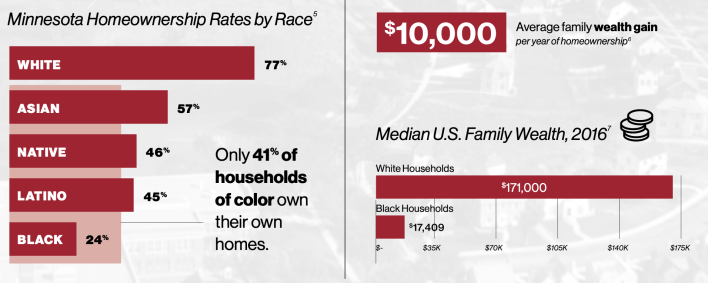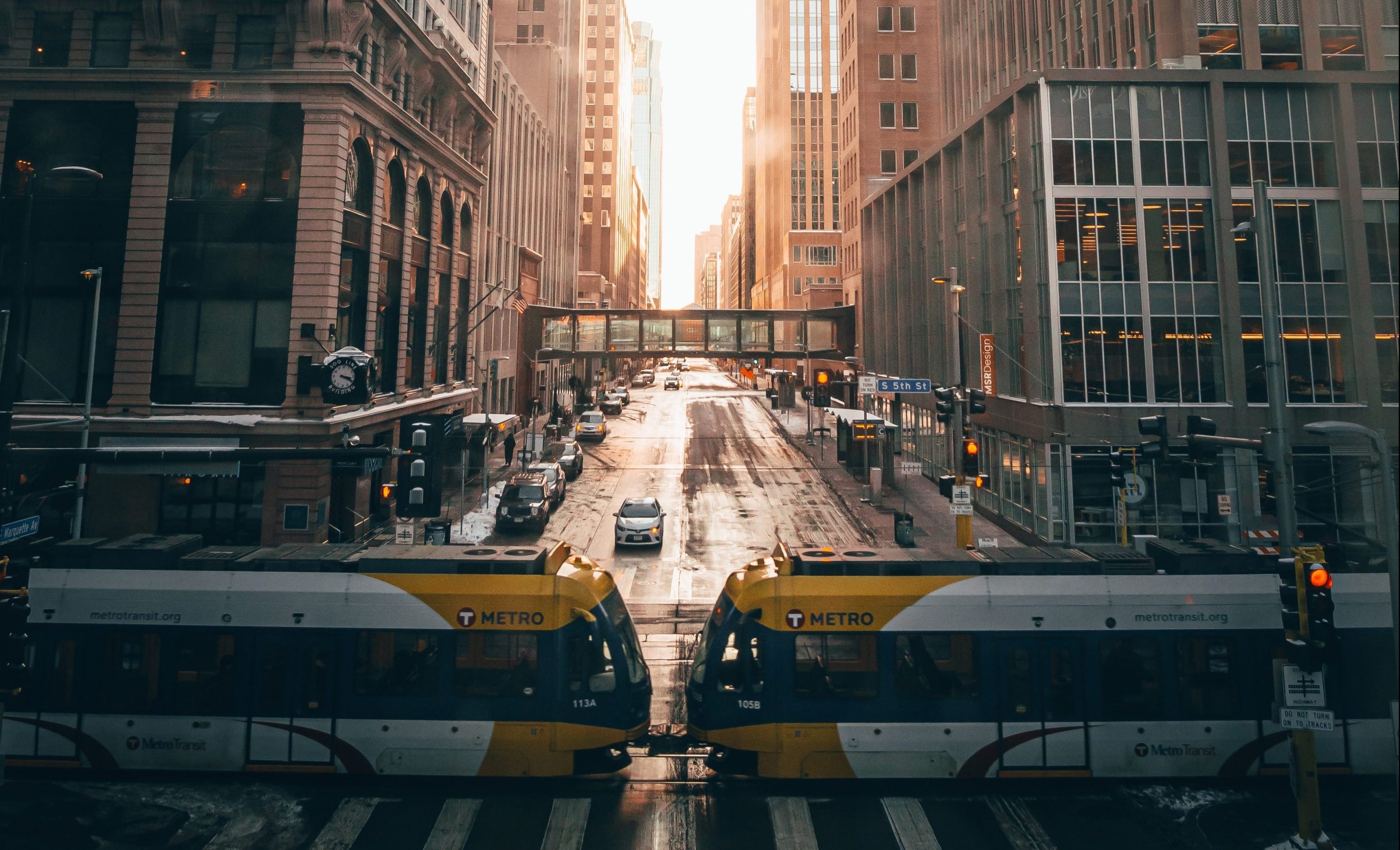By halting the implementation of a land-use plan hailed by sustainable transportation advocates as one of the most forward-thinking zoning codes in America, a Minnesota judge has stoked fears that environmental laws in other states will be deployed to defeat policies that reduce how much we drive.
Last week, a district court ruled that local officials could no longer enforce the so-called Minneapolis 2040 plan, which aimed to increase the housing supply and decrease car dependency in the Mill City. The plan had made the Minnesota metropolis the largest in the nation to eliminate parking minimums, as well as end single-family zoning, allowing developers to build small multi-family residences like duplexes and fourplexes in walkable neighborhoods and near transit. (Minneapolis officials have said they would appeal.)
So frustrating. I wish they had to do an environmental impact report of NOT passing zoning reform.
— Mark Hyams (@marktrumpet1975) September 11, 2023
The case hinges on a lawsuit brought by a coalition of environmental groups that argued that the city hadn't adequately studied the potential impacts of revising their zoning code to allow up to 150,000 new residential units by the titular year. And in an unusual twist, the foremost of those plaintiffs is a group called Smart Growth Minneapolis, whose name echoes a prominent advocacy organization that fights for policies exactly like Minneapolis 2040 — policies which they and many experts believe hold the key to reversing the environmental damage wrought by autocentric city planning.
“We are absolutely in support of the Minneapolis 2040 plan, because it does what Smart Growth intends to do — which is give people options, and make sure that regulatory structures allow for those options." said Calvin Gladney, president and CEO of Smart Growth America, which is not affiliated with the Minnesota group. "[Good comprehensive plans should] benefit our fight against climate change and positively affect affordability and economic mobility by creating the walkable and transit-rich communities that we believe everyone desires. ... It’s sad to hear that the 2040 plan is under attack, and especially that there’s a group called 'Smart Growth Minneapolis' attacking it."
Wielding environmental law against the environment
Minneapolis isn't the only U.S. community whose ambitious land-use reforms have come under fire from self-proclaimed environmental groups, despite decades of research that suggests it's simply not possible to avoid the worst of climate change without increasing housing density and reducing sprawl to discourage car use. In a recent editorial, Planetizen Editor-in-Chief James Brasuell cited "the large pile of innovative plans to allow more residential density undone by the consequences of environmental legislation" in states like California and Washington, whose policies aimed at protecting the natural world "are frequently wielded to prevent any form of development other than automobile dependent single-family detached housing."
The groups behind the lawsuit, though, essentially argue that the 2040 plan doesn't just allow for more residential density, but will unleash a rapid building free-for-all that would be catastrophic for the natural world — though the city of Minneapolis maintained in court that it would be lucky to get 40,000 new units built over the next 17 years under the plan, since zoning reform alone doesn't require that developers build anything at all.
Nonetheless, a 2018 environmental impact study commissioned by Smart Growth Minneapolis — which did not respond to a request for comment from Streetsblog — warned that Minneapolis 2040 would result in "increased noise," "increased light and glare from buildings," "increased stormwater runoff," as well as "increased vehicle traffic and congestion" and "increased parking constraints." (The group does concede that "increased pedestrian traffic" would probably be a result, too, though it's not clear whether it views that as an upside or downside.)

Advocates like Gladney argue that blocking policies that allow for more density doesn't actually avoid any of those environmental impacts — it just displaces them to the sprawling edges of town, where they are exacerbated. And he also argues that it makes matters worse for humans, particularly low-income people whose housing costs surge when the housing supply is artificially constrained, or who are forced to find cheaper options in far-flung neighborhoods that might require them to take on the costs of a car. In the Twin Cities, like most U.S. communities, those low-income households are disproportionately Black and brown.
“It is to the benefit of advancing racial equity, it is to the benefit of fighting against climate change, it is to the benefit of the economic mobility of communities of color, and individuals of color wherever they are, to have denser, more compact, connected communities that are served by transit and other mobility options," Gladney adds. "And we have to fight for that point."
'False virtue signals'
That point, needless to say, has been hotly debated by the opponents of Minneapolis 2040.
In court, Smart Growth Minneapolis has consistently maintained that the comprehensive plan would increase the value of neighborhoods too rapidly, pushing out long-term renters to make way for luxury high-rises. In a recent interview for the Minnesota Star Tribune, plaintiff's attorney Nekima Levy Armstrong (who also did not respond to a request from Streetsblog) even added that the plan "would have exacerbated" long-standing barriers to home ownership for residents of color "as a result of reduced access to and availability of single-family properties."
Armstrong is correct that Black and brown Minnesotans have some of the lowest rates of homeownership relative to their white neighbors in the nation — and the reasons why stem from racist policies like red-lining and eminent domain that razed neighborhoods of color for highways, gutting the intergenerational wealth of countless families in the process. Gladney questions the idea, though, that simply allowing developers to build multifamilies in more places would somehow result in a net loss of single-family homes — or that keeping existing neighborhoods under glass would mean BIPOC communities could someday buy in.
"All of the existing single-family housing stock still would be in Minneapolis," he stresses. "I don't know that there would be an immediate reduction in supply."

Addison Hill, a leader with a community organizing initiative called the Barbershops and Black Congregations Cooperative, said many Black Minnesotans do want to be homeowners someday — but right now, many can't even afford to pay their landlords. He's more focused on organizing for rent control policies than preventing developers from building duplexes (which some experts argue could help stabilize rents, too)

"Mainly, the big picture is just being able to get housing for people," Hill added. "We have harsh winters, and homelessness shouldn’t be as big of an issue here as it is. ... Personally, I’m a renter, and building equity and having a home is something I plan on doing at some point. But for people who want that and don’t have the means to do so, how do you actually plan to save? How do you actually do that with no cap on rent?"
Other Black Minneapolis leaders say Black neighborhoods like North Minneapolis are "often used as a political football in conversations like these, without directly speaking to and with the residents there," says Minister JaNaé Bates, communications director for the nonprofit ISAIAH.
“What we're finding with the debates around things like the 2040 plan are a handful of NIMBY folks who use 'racial equity' as a false virtue signal to instead try to force less affordable housing in areas near them,” added Bates in an email to Streetsblog. “This has allowed for the real culprits of less housing and home ownership for Black and Brown communities to continue to avoid blame and abdicate their responsibility for the harm [caused by] the corporate landlords and private equity groups that own the majority of single-family properties in predominately Black neighborhoods like North Minneapolis."
'If It's Not Equitable, It's Not Smart Growth'
With Minneapolis 2040 on pause, advocates across the country are waiting to see whether "America's leading yes-in-my-backyard story" will get a second act — or influence other judges across the country to allow environmental review processes to quash land use reform before it has a real chance to make a difference.
Advocates like Gladney hopes that won't happen — and that the public and the courts alike will recognize the importance of real Smart Growth principles.
“A cheat code for anybody who’s trying to understand whether something is Smart Growth is: if it is not equitable, it's not Smart Growth," Gladney added. "If someone's using the banner of 'Smart Growth' to fight for something that ultimately will reduce affordability, will ultimately reduce economic mobility, or ultimately not fight against our climate crisis, then you can know right there that it's not Smart Growth. And I just want to say that to the shout out to the mountaintops as much as I can.”






